The Windows RT Review
by Vivek Gowri & Anand Lal Shimpi on October 25, 2012 12:00 PM EST- Posted in
- Windows RT
- Operating Systems
- Microsoft
- Mobile
- Windows 8
- Tablets
Office 2013 for Windows RT
Office 2013 is the headlining application for Windows RT. And it’s a pretty big deal - this is the first time we’re seeing the full Office experience reach a modern tablet platform, at least in the first party sense. In the smartphone world, this wasn’t as much of a distinguishing factor as Microsoft hoped it would be when they included a mobile version of the full Office suite in Windows Phone 7, but that’s because there’s relatively little scope for document creation or editing on handhelds. In the tablet world though, it’s huge. For a tablet to truly be a viable replacement for a notebook, office productivity needed to be addressed.
So Microsoft decided to do something about it: Office 2013 Home and Student Edition ships as a pre-installed part of every single Windows RT tablet. And just like that, almost every non-engineering student I know could get away with a Windows RT tablet as their primary computing device, provided they aren’t gamers or aren’t attached to the idea of local storage. It’s something I couldn’t say about the iPad or any of the Android tablets out there. But I’m getting ahead of myself here. Let’s look at the applications themselves.
Office Home and Student contains Word, Excel, PowerPoint, and OneNote, so you get the core three productivity applications, as well as the one with the most potential for tablets. The one application that will probably be missed most is Outlook, but with Outlook account support for both the Mail and Calendar apps, enough of the functionality is still available. Outlook is more power-user oriented than either Mail or Calendar, but when it comes down to it, Windows RT was created to serve a more consumer-oriented market segment that typically doesn’t rely on the more intricate functionality of Outlook.
Design was always the biggest question about creating a mobile office suite. How much would Microsoft be willing to change the interface to suit a touchscreen input? How much functionality would that give up? How would Excel even work? I don’t actually have an answer, but here’s where the thinking went: why bother designing a touch-centric typing or spreadsheet app if most people are going to turn to a physical keyboard to use it anyways? And it’s a line of reasoning that makes sense - beyond going completely to voice control, I cannot see myself using any word processor without touching a physical keyboard. And many of the more complex functions of Excel, like formulas and macros, would be near impossible to replicate on a touch-centric UI without neutering a decent amount of the power and control users have.
So, instead of redesigning Office to fit within the new Modern UI guidelines, Microsoft simply ported the x86 version of Office 2013 over to ARM and runs it as a desktop application. I can’t blame them - Office 2013 was redesigned with the Metro design language, so it already fit the Windows RT visual style, and it was just easier for them to not mess with the UI or UX further. But that’s actually a good thing - Office is the killer application for RT because it functions exactly the same as Office 2013 on any other system. If you live in the world of Office 2013 and SkyDrive, this is fantastic news because you need to make almost no adjustments to your workflow. It’s just as capable and powerful on here as it is on any other Windows system.
Office isn’t perfect, and you can level any number of complaints at it - aggravating at times, uses proprietary file formats, resource intensive, expensive, difficult to learn, and I’m only scratching the surface. Based on my usage of the Office 2013 Preview on Windows 7 and RT, it’s actually my favorite version yet, so there’s that, but the main point is that this is still a full-fledged version of Office that we’re talking about here. Over the last two decades, people have learned to put up with its quirks and faults, and it’s still one of the single most important pieces of productivity software on the market.
So, how does it all work? Pretty well, all things considered. All of these applications are pretty much exactly as you would find on an x86 PC, so I’m not going to go very far into the design and functionality, though there are a couple of interesting use-cases that I’ll bring up later on. The most critical concern I had going into Office on ARM was performance - the reputation for being a resource-intensive software suite is not undeserved, let’s put it that way, and quad-core A9, great as it is, doesn’t have the raw compute horsepower of Atom much less Core 2 or any newer Intel processor.
In Word, it’s relatively easy to pull 30% CPU utilization when typing quickly. Anand saw up to 40% on Surface, and I managed to get CPU utilization all the way up to 55% when pressing random keys as quickly as possible. Compare this to Notepad, which usually hovers in the 5-10% CPU utilization range, and it’s clear to see how heavy a load Office puts on the system. Even with the high CPU utilization though, I never saw any lag in the characters appearing, so it’s mostly an interesting point to note and not an issue with the typing experience.
Update: Microsoft shared an official response with us about the high CPU utilization we're seeing:
Increases in CPU utilization while typing are an expected behavior in Word, but should not extend beyond the immediate typing. However, we are always looking at ways to improve CPU utilization and the customer experience with Office.
To really push the system, I loaded up some of the Excel files I work with at my real life job as an automotive technology researcher. These are raw and mostly unprocessed dynamometer data test files, with roughly 3 million data cells each (give or take.) The largest had just under 4 million data cells and was 39MB in size, smallest about 1.8 million and 19MB in size. A couple of graphs and some equations. Together, the four files totaled 112MB. I decided to open all four at once - it took about a minute and a half, with a max CPU load of 72%. It was crazy, but once everything was loaded, performance was actually decent. I wouldn’t want to necessarily work on the files for extended periods with a system like this - the screen is too small, and the couple of bits of lag would drive me nuts (plus, without Matlab, it’s a bit pointless) but for quick graphing of basic data, it works significantly better than expected.
The good thing is that there’s a lot of RAM here - with 2GB seeming to be the default for Windows RT tablets you’re rarely memory starved. So even with 250MB worth of RAM dedicated to Excel, CPU headroom is still the main limiting factor. For more basic Excel tasks, like the chemistry labs that were commonly assigned in undergrad, there’s definitely more than enough power here. The files I loaded up are typically only manipulated on quad-core workstation notebooks and are far and away an extreme use case.
I didn’t really spend a whole lot of time in PowerPoint, because I typically don’t use it very much. I loaded up a presentation I gave late last year about some of my research at the time, and started editing it to see if the experience had anything different to mention. Performance seemed good enough, with maybe a hint of frame drop when scrolling through the slide thumbnails on the right edge (it moves at something closer to 25 FPS than 30). I liked the ability to swipe back and forth between slides when in Presentation mode, that’s one nice thing about the tablet interface. Other than that, this is just PowerPoint on a smaller screen.
OneNote is the one that I was really interested in. Because even though it runs within the framework of the Windows desktop, it’s an application that really lends itself to tablet usage. Back in the tablet PC days, OneNote was the killer usecase, the one program that really lent itself to being used in conjunction with pen-input. I came very close to buying a Wacom-enabled tablet on numerous occasions for the specific purpose of taking electronic lecture notes with OneNote. (It never happened, and I ended up taking very few notes of any kind through college, but such is life.)
Now, without active digitizer support on most Windows RT tablets (I haven’t seen any with active digitizers), you’re limited to either keyboard or capacitive touch input. This is where the handwriting panel comes in, and like I mentioned before, it’s quite good even when you’re just using your finger to write. With a capacitive stylus (which I regrettably do not have on hand) I can see this being legitimately useful to take handwritten notes on. It’s good enough that you can get away without a Wacom-enabled tablet if you don’t want to shell out the extra $400 or so. I genuinely wish something like this was available when I was still in the notetaking phase of college, many moons ago - the fifteen year old me would have killed to have a $600 tablet with solid handwriting recognition, even without an active digitizer.
And that’s really what makes Office for Windows RT interesting. It gives you 95% of the office suite experience and capability of any normal desktop or notebook PC in the modern tablet form factor, introducing some much needed productivity into what was previously a very content-consumption oriented device category.


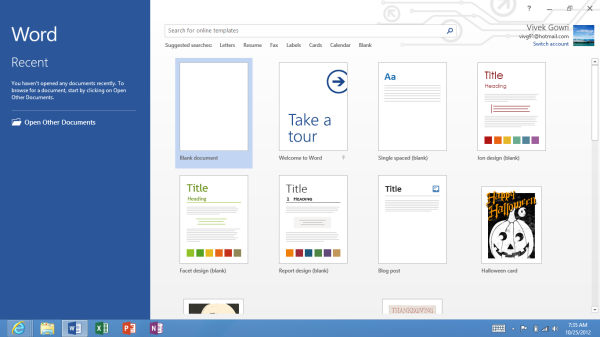
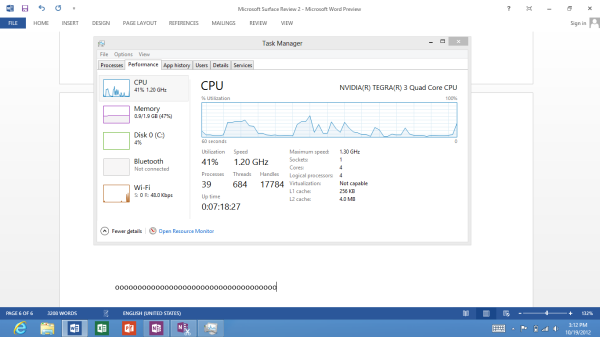
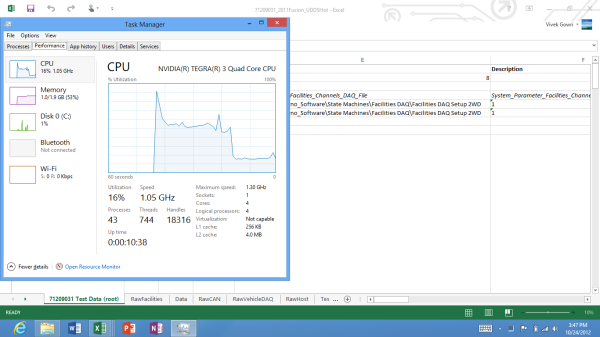
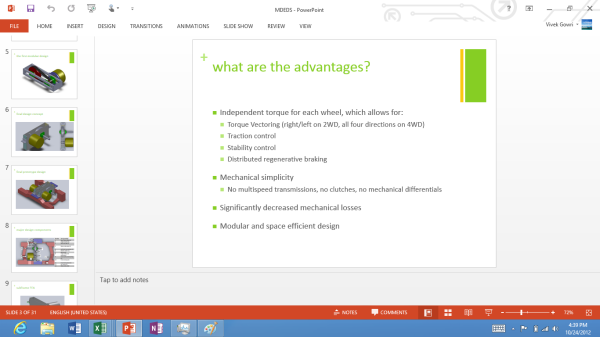
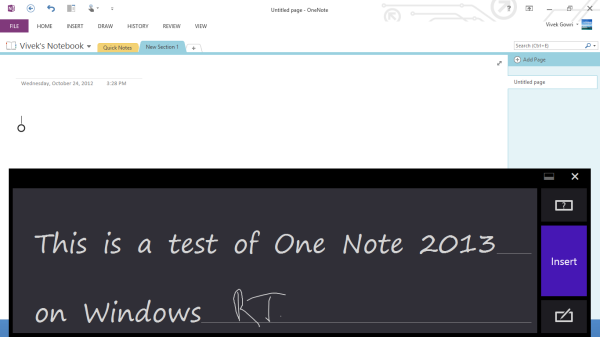








233 Comments
View All Comments
Flemo86 - Saturday, October 27, 2012 - link
With WindowsRT (oh God what an awful name) they're now competing with Apple on Apple's terms, and Apple have had a 5 year head start with iOS. It's just ridiculous that they have .NET, XNA, DirectX etc at such a sweet spot right now, with so many developers on board and able to program whatever the hell they want for the OS (complete with file system!), and then they just change the game entirely by tearing x86 out and putting in what may as well be an Apple chip.They should have come up with a better solution to use ALL existing software and their architectures with every device, not just the "Pro" version. That would've been real competition with the iPad. Imagine being able to port all Xbox live arcade games and every .NET application to the "Windows App Store"/Marketplace (whatever they're calling it). All Microsoft would have to do is verify each piece of software and then bada-bing bada-boom, you've got yourself tens of thousands of apps within the month, and an extremely easy set of tools for devs to use.
Of course, this would've required more effort on the hardware side. Maybe less battery life? A lower screen resolution? More effort on Intel's part? I really hope Windows RT falls by the wayside and Windows 8 Pro tablets become the de facto standard. I hate the idea of them throwing a decade worth of development tools out on one of their operating systems.
Sorry for the rant, just an XNA fan!
stimudent - Saturday, October 27, 2012 - link
Since this system uses Windows and an ARM processor instead of an Intel processor, that makes it 50% respectable. To achieve the other 50%, it would have to have Linux installed.yyrkoon - Sunday, October 28, 2012 - link
Ok, I'll bite.Whats so good about Linux ?
Polish ? Security ? painless upgrade path ? The majority of modern games played on the PC are written for this software platform ?
Or is it that you can feel good about your own self using it for free. Without having to use pirates bay ?
Seriously. Grow up.
Also, please tell me you use Ubuntu. So the rest of us can have a good laugh, and totally disregard what you have to say in the future.
B3an - Sunday, October 28, 2012 - link
That made me laugh, because it's true.foolsgambit11 - Saturday, October 27, 2012 - link
that points out that the autumn of 2000 is just before the turn of the new millenium, not just after....milkod2001 - Sunday, October 28, 2012 - link
@yyrkoonwhat's good about Linux?
lol u gotta be kidding
Android is based on Linux so iOS . That covers all Apple platform and the rest of all smartphones and tablets. Most servers are running on Linux. Not enough?
The majority of modern games played on the PC are written for this software platform ?
The majority of modern games are coded for console kids(Xbox and PS3), then ported to PC.PC games market is only the niche part of games market anyway.
Ubuntu is for geeks/scientisc/developers and not for average uneduceted joes
solipsism - Sunday, October 28, 2012 - link
"Android is based on Linux so [is] iOS."Um... double no.
Android uses the Linux kernel and some underlying code but it is not Linux in the way stimudent is talking about which is why we call it Android and not Linux or Android Linux.
iOS uses Darwin OS and foundations and frameworks found in Mac OS X. "Darwin is built around XNU, a hybrid kernel that combines the Mach 3 microkernel, various elements of BSD (including the process model, network stack, and virtual file system), and an object-oriented device driver API called I/O Kit.[6] The hybrid kernel design compromises between the flexibility of a microkernel and the performance of a monolithic kernel." All this came from NeXTSTEP and BSD before that. There is no Linux in iOS.
yyrkoon - Sunday, October 28, 2012 - link
Yeah notable features at least in my mind is that Android uses ( as standard ) A virtual machine to run each application. Kind of, but not the same as JRE..Big difference from Linux just in that. The architecture is really interesting. Despite the fact that java is the primary development language used for creating apps. Unless you choose to write native C/C++, or use a third party "scripting language". Passed that I'm sure you'd be able to write standard kernel level drivers, but yeah . . .
Mono for android is particularly interesting to me, but a bit pricey.
yyrkoon - Sunday, October 28, 2012 - link
Ubuntu is garbage.Architecturally it can be unstable, it has a very poor upgrade path track record, and they want to put google search on your desktop.
All that despite the fact that is based on one of the better distro's around IMHO. Debian.
yyrkoon - Sunday, October 28, 2012 - link
Oh and yeah to follow up on what was left out of the comments to your post.Most network admins I know that want the least bit of hassle when dealing with servers do not always opt for Linux. Just for the sake of using Linux. These people realize that an operating system is a tool, all of which have their strong and weak points. With OSX being somewhere in the middle. My post above down to the first four lines of text were pure sarcasm. With the fifth and sixth lines being tongue in cheek.
Any operating system is only as good as the user using it. It does not matter what it is. IF the user is a dumbshit, or does not care .The given OS will probably not work optimally (ever). With varying degrees of optimal operation in between, based on how well the user understands his/her operating system.
Also, we're talking computers here, not gaming consoles. With *ALL* PC games being written on some form of a PC. For the PC. Some being Linux dev machines for cross platform development, but most being Windows / visual studio developers. Ask around the game development community sometime, and ask who uses Windows / visual studio versus Linux / eclipse or some other IDE. You'll find out for yourself. This is for a good reason too. Windows / directx being the prevalent software gaming platform. For the PC. Not to mention the fact that porting games to the xbox is fairly trivial now days. Depending on the tool set you use.
"Ubuntu is for geeks/scientisc/developers and not for average uneduceted joes"
Uh yeah . . . I think this "sentence" speaks for its self.